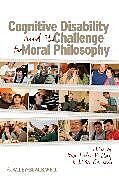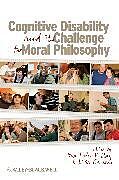Cognitive Disability and Its Challenge to Moral Philosophy
Einband:
Kartonierter Einband
EAN:
9781405198288
Untertitel:
Englisch
Genre:
Philosophie
Autor:
Eva Feder (Stony Brook University, Usa) Ca Kittay
Herausgeber:
John Wiley & Sons
Anzahl Seiten:
442
Erscheinungsdatum:
14.05.2010
ISBN:
978-1-4051-9828-8
Informationen zum Autor Eva Feder Kittay is Professor of Philosophy, Women's Studies Affiliate, and Senior Fellow of the Center for Medical Humanities, Bioethics and Compassionate Care at Stony Brook University, New York. Her published works include Love's Labor: Essays on Women, Equality, and Dependency (1998); The Blackwell Guide to Feminist Philosophy (co-edited with Linda Martín Alcoff, Blackwell, 2006); The Subject of Care: Feminist Perspectives on Dependency (with Ellen K. Feder, 2003); and Metaphor: Its Cognitive Force and Linguistic Structure (1990). She is also the mother of a cognitively disabled woman. Licia Carlson is Assistant Professor of Philosophy at Providence College. Her research interests include 20th-century French philosophy, ethics, feminist theory, philosophy and disability, and the philosophy of music. She has published articles on bioethics, feminist theory, disability, and the works of Michel Foucault, and has written a book entitled The Faces of Intellectual Disability: Philosophical Reflections . Klappentext We have been taught that all humans share intrinsic qualities that lend them a common dignity. Philosophers conceive of a certain level of cognitive capacity as the very mark of humanity, and extend the mantle of equal moral fellowship to these "persons." But what of individuals with diminished cognitive abilities? Cognitive disability poses significant challenges to these fundamental philosophical concepts, prompting a variety of difficult questions. Should those with cognitive disabilities be excluded from the protections and responsibilities we routinely assign to "persons"? Are we forced to reconsider the very concept "personhood"? How should the interests of people with cognitive disabilities and their caregivers be represented politically? Who is responsible for guaranteeing their care? And to what extent ought they be granted autonomy? Cognitive Disability and Its Challenge to Moral Philosophy addresses these concerns in a series of thought-provoking essays contributed by some of the most prominent moral philosophers of our time, as well as clinicians and medical historians. Collectively, the essays represent an important milestone in contemporary thinking about ethical considerations relating to people with cognitive disabilities. Zusammenfassung Through a series of essays contributed by clinicians! medical historians! and prominent moral philosophers! Cognitive Disability and Its Challenge to Moral Philosophy addresses the ethical! bio-ethical! epistemological! historical! and meta-philosophical questions raised by cognitive disability. Inhaltsverzeichnis Notes on Contributors. 1. Introduction: Rethinking Philosophical Presumptions in Light of Cognitive Disability (Licia Carlson and Eva Feder Kittay). Part 1: Intellectual Disability: The Medical Model and Beyond 2. The Limits of the Medical Model: Historical Epidemiology of Intellectual Disability in the United States (Jeffrey P. Brosco). 3. Developmental Perspective on the Emergence of Moral Personhood (James C. Harris). Part 2: Justice 4. The Capabilities of People with Cognitive Disabilities (Martha Nussbaum). 5. Equality! Freedom! and/or Justice for All: A Response to Martha Nussbaum (Michael Berube). 6. Respecting Human Dignity: Contract Versus Capabilities (Cynthia A. Stark). 7. Duties of Justice to Citizens with Cognitive Disabilities (Sophia Isako Wong). Part 3: Care 8. Cognitive Disability in a Society of Equals (Jonathan Wolff). 9. Holding One Another (Well! Wrongly! Clumsily) in a Time of Dementia (Hilde Lindemann). 10. Agency and Moral Relationship in Dementia (Bruce Jennings). Part 4: Agency 11. Cognitive Disability! Paternalism! and the Global Burden of Disease (Daniel Wikler). 12. Responsibility! Agency! and Cognitive Disability (David Shoemak...
Autorentext
Eva Feder Kittay is Professor of Philosophy, Women's Studies Affiliate, and Senior Fellow of the Center for Medical Humanities, Bioethics and Compassionate Care at Stony Brook University, New York. Her published works include Love's Labor: Essays on Women, Equality, and Dependency (1998); The Blackwell Guide to Feminist Philosophy (co-edited with Linda Martín Alcoff, Blackwell, 2006); The Subject of Care: Feminist Perspectives on Dependency (with Ellen K. Feder, 2003); and Metaphor: Its Cognitive Force and Linguistic Structure (1990). She is also the mother of a cognitively disabled woman.
Licia Carlson is Assistant Professor of Philosophy at Providence College. Her research interests include 20th-century French philosophy, ethics, feminist theory, philosophy and disability, and the philosophy of music. She has published articles on bioethics, feminist theory, disability, and the works of Michel Foucault, and has written a book entitled The Faces of Intellectual Disability: Philosophical Reflections.
Klappentext
We have been taught that all humans share intrinsic qualities that lend them a common dignity. Philosophers conceive of a certain level of cognitive capacity as the very mark of humanity, and extend the mantle of equal moral fellowship to these "persons." But what of individuals with diminished cognitive abilities? Cognitive disability poses significant challenges to these fundamental philosophical concepts, prompting a variety of difficult questions. Should those with cognitive disabilities be excluded from the protections and responsibilities we routinely assign to "persons"? Are we forced to reconsider the very concept "personhood"? How should the interests of people with cognitive disabilities and their caregivers be represented politically? Who is responsible for guaranteeing their care? And to what extent ought they be granted autonomy?
Cognitive Disability and Its Challenge to Moral Philosophy addresses these concerns in a series of thought-provoking essays contributed by some of the most prominent moral philosophers of our time, as well as clinicians and medical historians. Collectively, the essays represent an important milestone in contemporary thinking about ethical considerations relating to people with cognitive disabilities.
Zusammenfassung
Through a series of essays contributed by clinicians, medical historians, and prominent moral philosophers, Cognitive Disability and Its Challenge to Moral Philosophy addresses the ethical, bio-ethical, epistemological, historical, and meta-philosophical questions raised by cognitive disability.
Inhalt
Notes on Contributors. 1. Introduction: Rethinking Philosophical Presumptions in Light of Cognitive Disability (Licia Carlson and Eva Feder Kittay). Part 1: Intellectual Disability: The Medical Model and Beyond 2. The Limits of the Medical Model: Historical Epidemiology of Intellectual Disability in the United States (Jeffrey P. Brosco). 3. Developmental Perspective on the Emergence of Moral Personhood (James C. Harris). Part 2: Justice 4. The Capabilities of People with Cognitive Disabilities (Martha Nussbaum). 5. Equality, Freedom, and/or Justice for All: A Response to Martha Nussbaum (Michael Berube). 6. Respecting Human Dignity: Contract Versus Capabilities (Cynthia A. Stark). 7. Duties of Justice to Citizens with Cognitive Disabilities (Sophia Isako Wong). Part 3: Care 8. Cognitive Disability in a Society of Equals (Jonathan Wolff). 9. Holding One Another (Well, Wrongly, Clumsily) in a Time of Dementia (Hilde Lindemann). 10. Agency and Moral Relationship in Dementia (Bruce Jennings). Part 4: Agency 11. Cognitive Disability, Paternalism, and the Global Burden of Disease (Daniel Wikler). 12. Responsibility, Agency, and Cognitive Disability (David Shoemaker). 13. Alzheimer's Disease and Socially Extended Mentation (James Lindemann Nelson). 14. Thinking About the Good: Reconfiguring Liberal Metaphysics (or Not) for People with Cognitive Disabilities (Anit…

Leider konnten wir für diesen Artikel keine Preise ermitteln ...
billigbuch.ch sucht jetzt für Sie die besten Angebote ...
Die aktuellen Verkaufspreise von 5 Onlineshops werden in Realtime abgefragt.
Sie können das gewünschte Produkt anschliessend direkt beim Anbieter Ihrer Wahl bestellen.
Loading...
Die aktuellen Verkaufspreise von 5 Onlineshops werden in Realtime abgefragt.
Sie können das gewünschte Produkt anschliessend direkt beim Anbieter Ihrer Wahl bestellen.
| # | Onlineshop | Preis CHF | Versand CHF | Total CHF | ||
|---|---|---|---|---|---|---|
| 1 | Seller | 0.00 | 0.00 | 0.00 |
